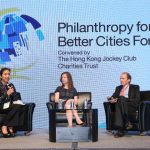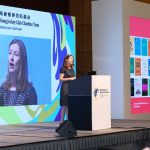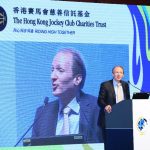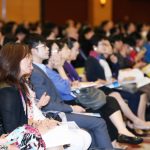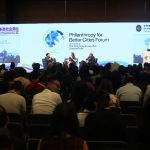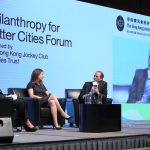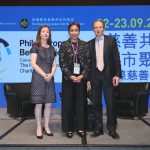Speakers:
- Helen Goulden Executive Director, Innovation Lab of Nesta
- Jonathan Woetzel Director, McKinsey Global Institute
Facilitator:
- Watanan Petersik Founder, Asia Capital Advisory
In this plenary session, the panelists shared their insights and knowledge of how philanthropy can be leveraged to foster better cities for the future.
Ms. Goulden spoke of the need for philanthropy to work across boundaries, funding innovations for public benefit. She also mentioned it is important for all philanthropists to be a force for creativity and innovation, not just funding hardware or direct social interventions. One such example is the support of innovation in cities through technology for Smart Cities. The GoodSAM [Smartphone Activated Medics] mobilizes citizens to interact with public services. This was pioneered by a doctor who didn’t have funding support but was able to obtain philanthropic support that not only provided him with the funding but also the connections that enabled him to launch the app.
Mr. Woetzel talked about the structural factors that make cities great, and how and where philanthropy can contribute. He noted that a great city balances environment, economics, and societal needs. “We shape our cities, then our cities shape us” show that a city is not just the physical infrastructure within which its people live and work, but also the community, culture and norms that develop over time. He said that people within cities don’t like to be compared with other cities. They want to be a better version of themselves. But to be better, there must be growth.
Mr. Woetzel also talked about cities needing to do more with less. Also that cities development doesn’t just happen from the top down. For instance, the current mayor of Seoul (Mayor Park) introduced transparency, open data, and made his decisions available to the public to see. The Seoul city is notable for being one of the most wired in the world.
Mr. Woetzel also noted the role of philanthropy can be that of change agents, serving as a bridge between top down execution and bottom-up social change. He also reiterated the comment made on day 1 on the need to have policies that are for all people and for all sectors, not just the majority. This requires an intentionality to be inclusive and to focus on outcomes rather than one’s own sector goals.
Ms. Petersik at the close of the panel asked for concluding thoughts. Ms. Goulden commented on the need to “drop organizational ego” and being willing to be part of a shared success. Mr. Woetzel offered that philanthropists should not just have a sense of mission but also a sense of humor – “appreciate the process and the journey.”
